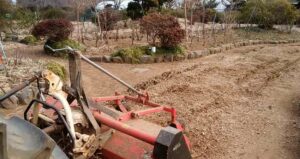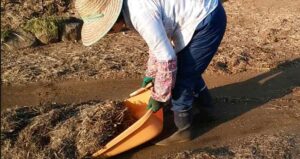Q&A With Master Seki About Organic Compost
Organic compost is the cornerstone of a healthy soil and the foundation for beautiful peonies. Here are a few common questions and answers that we hope will help you understand our farming methods used to make the organic compost used in this special soil. At Peony Garden Tokyo we love to hear your questions. If you ever have a question, send us a message or on Facebook, and we'll try to answer it. Or, just ask Master Seki the next time you are in the garden.

What is “compost”?
When we say compost, we are using the Japanese word, taihi, which is a homemade fertilizer. Rather than using animal dung, we make piles compost consisting of straw, fallen leaves, weeds, and algae and let them ferment naturally.
 What advantages does “compost” have?
What advantages does “compost” have?
Compost makes a very soft, fluffy soil in which the plant's roots can grow easily. Compost also retains many kinds of things like nutrients and enzymes, and it protects roots. Our compost is made from organic substances, which create the right amount of nitrogen. All of these things combined make the Peony Garden Tokyo's compost a great fertilizer for plants.
What is the “organic farming & enzymatic farming”?
Sometimes people ask us, "what does it mean to be an organic product?" An organic product is grown using a method that does not use ANY pesticide. It means that you don't use any artificial chemical pesticide, nor do you use pesticides made from 100% natural ingredients.
Organic farming harnesses the innate power of plants that can resist disease and insects. Peony Garden Tokyo, we are dedicated to the 100% natural and independent growth of botan and shakuyaku.
 What makes “enzymatic farming” great?
What makes “enzymatic farming” great?
In nature, it takes years for leaf mold to become rich. However, we have developed a new way to quickly ferment soil, using the power of natural enzymes. This breakthrough in agriculture makes it possible to grow 50,000 beautiful peonies at our garden.
Peony Stress Facts
Just like humans, peonies feel stress.
That's why careful attention is given to the entire garden to identify the first signs of stress. Here are some of the warning signs we look for that lead to stress:
Temperature (too high, too low, freezing temperature)
Light (too much, too little, ultraviolet)
Water (too much, or too little)
Nutrition (too little, too much, salt, heavy metals, competition with other plants)
External forces (eaten by insects, touched and damaged by humans/animals)
Diseases (mildew, black spots, root rot)

